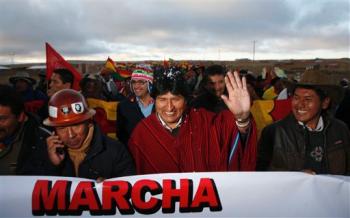(left) Slideshow -Go to original article,
nine photo slideshow at top...
Bolivia's Morales renounces possible third term
October 20, 2008 - Associated Press
By DAN KEANE
LA PAZ, Bolivia (AP) -- President Evo Morales agreed on Monday to seek only one more five-year term, a key concession that all but ended a standoff in Congress over a new constitution to empower Bolivia's long-oppressed indigenous majority.
The agreement, announced by Vice President Alvaro Garcia, came as more than 100,000 of the president's supporters packed the streets of the capital to root for the new charter.
The proposed constitution has been widely celebrated by the president's poorer, largely Indian supporters but has met fierce resistance from the middle and upper classes in the lowland east, who say it overlooks their demands for greater regional autonomy.
Lawmakers continued to debate eastern autonomy, long the thorniest issue of the new constitution, as they convened behind closed doors Monday night to fine-tune the charter's details before calling for a national referendum.
They agreed to meet after Garcia announced that Morales had pledged to "only participate in one re-election, for the 2009-2014 term."
The president, meanwhile, appeared before thousands of supporters packed shoulder-to-shoulder in a plaza outside Congress to announce that the constitutional referendum will be held Jan. 25.
Nationwide elections -- for president, vice president, and a Congress that will be reorganized by the new constitution -- will follow on Dec. 6, 2009, he said.
Morales did not appear to dampen his supporters' enthusiasm with his re-election concession, and he grinned widely as a small sea of hard-hatted miners, packed in too tight to dance, bobbed in place to the music of a traditional Andean folk group.
Morales' proposed new charter would allow him to serve two consecutive five-year terms. He had planned to start counting the terms only after a victory in general elections next year, to be held if voters approve the constitution.
Critics had charged that the leftist leader -- Bolivia's sixth president since 2000 -- aimed to vastly extend his stay in power. But Morales' concession meets conservative opposition demands that his current term, begun in 2006, should count against the total, limiting his possible rule to 2014 instead of 2019.
Under current law, Bolivia's presidents can only serve two, nonconsecutive five-year terms.
Morales, a veteran street protester, rose before dawn Monday to join hordes of flag-waving miners, petroleum workers, and peasant farmers from across the country in the final stretch of a weeklong, 125-mile (200-kilometer) march across Bolivia's chilly high plains.
His supporters "only want the constitution to be put before the people, so the people can say yes or no," Morales told The Associated Press as he marched in black sneakers and a traditional red woolen poncho. "It's the most democratic way."
Morales drew 67 percent support in an August recall vote, and his new constitution is expected to pass easily. But the president's narrow majority in Congress is not enough to call the constitutional referendum, which requires a two-thirds vote.
The new constitution's lengthy bill of rights includes a long section dedicated to indigenous groups, and would grant them autonomy over their traditional lands and a "priority" share of the country's natural resources wealth.
